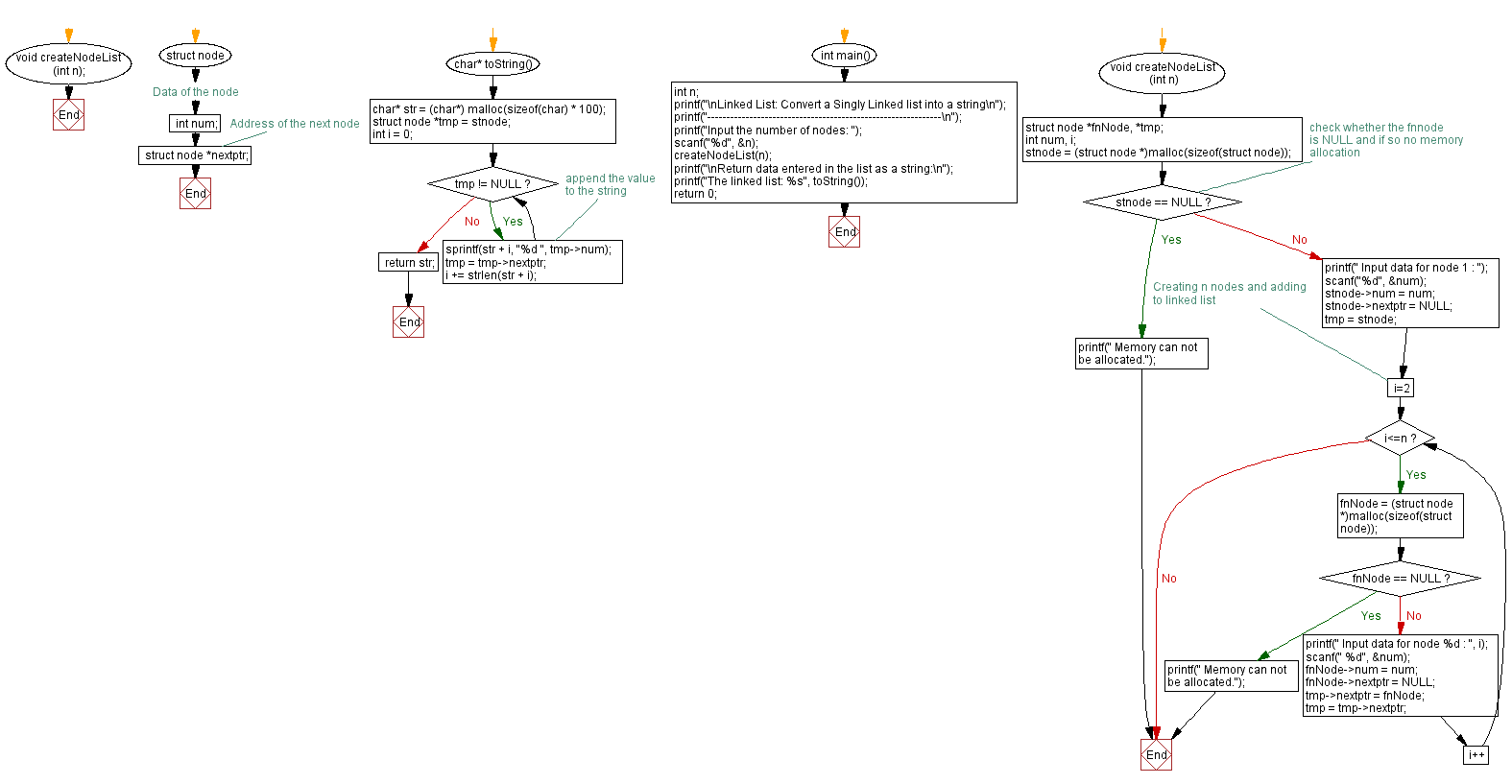C Exercises: Convert a Singly Linked list into a string
11. Linked List to String Challenges
Write a C program to convert a Singly Linked list into a string and returns it.
Sample Solution:
C Code:
#include <stdio.h>
#include <stdlib.h>
// Structure for a doubly linked list node
struct node {
int num;
struct node * preptr; // Pointer to the previous node
struct node * nextptr; // Pointer to the next node
}*stnode, *ennode; // Pointers for the starting and ending nodes
// Function prototypes
void DlListcreation(int n);
void displayDlList();
int main() {
int n;
stnode = NULL; // Initializing starting node to NULL
ennode = NULL; // Initializing ending node to NULL
printf("\n\n Doubly Linked List : Create and display a doubly linked list :\n");
printf("-------------------------------------------------------------------\n");
printf(" Input the number of nodes : ");
scanf("%d", &n);
DlListcreation(n); // Function call to create a doubly linked list
displayDlList(); // Function call to display the doubly linked list
return 0;
}
// Function to create a doubly linked list
void DlListcreation(int n) {
int i, num;
struct node *fnNode;
if(n >= 1) {
stnode = (struct node *)malloc(sizeof(struct node));
if(stnode != NULL) {
printf(" Input data for node 1 : "); // assigning data in the first node
scanf("%d", &num);
stnode->num = num;
stnode->preptr = NULL;
stnode->nextptr = NULL;
ennode = stnode; // Setting ending node as starting node initially
// Loop to get input data for rest of the nodes
for(i = 2; i <= n; i++) {
fnNode = (struct node *)malloc(sizeof(struct node));
if(fnNode != NULL) {
printf(" Input data for node %d : ", i);
scanf("%d", &num);
fnNode->num = num;
fnNode->preptr = ennode; // New node is linking with the previous node
fnNode->nextptr = NULL;
ennode->nextptr = fnNode; // Previous node is linking with the new node
ennode = fnNode; // Assign new node as last node
} else {
printf(" Memory can not be allocated.");
break;
}
}
} else {
printf(" Memory can not be allocated.");
}
}
}
// Function to display the doubly linked list
void displayDlList() {
struct node * tmp;
int node_num = 1; // Variable to count node numbers
if(stnode == NULL) {
printf(" No data found in the List yet.");
} else {
tmp = stnode;
printf("\n\n Data entered on the list are :\n");
while(tmp != NULL) {
printf(" node %d : %d\n", node_num, tmp->num);
node_num++;
tmp = tmp->nextptr; // Current pointer moves to the next node
}
}
}
Sample Output:
Linked List: Convert a Singly Linked list into a string ------------------------------------------------------------- Input the number of nodes: 3 Input data for node 1 : 10 Input data for node 2 : 20 Input data for node 3 : 30 Return data entered in the list as a string: The linked list: 10 20 30
Flowchart :

For more Practice: Solve these Related Problems:
- Write a C program to convert a singly linked list into a comma-separated string.
- Write a C program to transform a linked list into a formatted string with each node value enclosed in brackets.
- Write a C program to convert a linked list into a string in reverse order.
- Write a C program to convert only those nodes that satisfy a specific condition (e.g., odd numbers) into a string.
Go to:
PREV : Search Element Variants.
NEXT :Linked List to Array Variants.
C Programming Code Editor:
Have another way to solve this solution? Contribute your code (and comments) through Disqus.
What is the difficulty level of this exercise?
